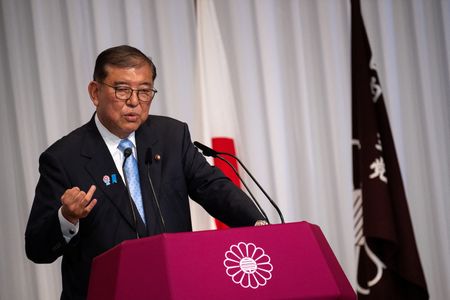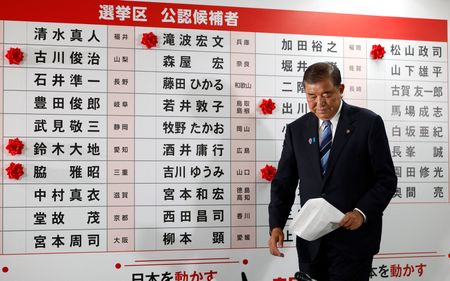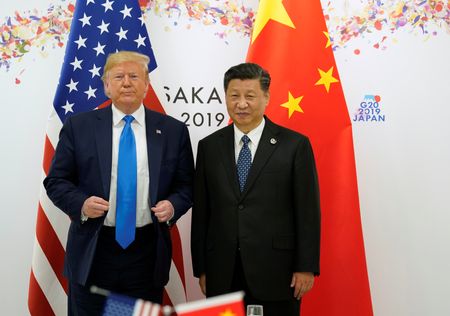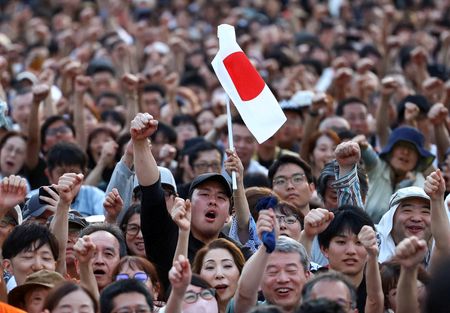By John Geddie and Tim Kelly
TOKYO (Reuters) -Japanese Premier Shigeru Ishiba vowed to remain in his post on Monday after his ruling coalition suffered a bruising defeat in upper house elections, prompting some in his own party to doubt his leadership as the opposition weighed a no-confidence motion.
The embattled prime minister told a news conference he would remain in office to oversee tariff talks with the United States and other pressing matters, such as rising consumer prices that are straining the world’s fourth-largest economy.
“I will stay in office and do everything in my power to chart a path toward resolving these challenges,” Ishiba said, adding that he intended to speak directly with U.S. President Donald Trump as soon as possible and deliver tangible results.
Speaking in an interview with CNBC on Monday, U.S. Treasury Secretary Scott Bessent was asked about the Japanese election and the effect it could have on trade negotiations. He said the Trump administration was less concerned with Japan’s domestic politics than with getting the best deal for Americans.
A spokesperson for the U.S. State Department called the U.S.-Japan alliance the “cornerstone of peace, security, and prosperity in the Indo-Pacific and across the world” and said it had “never been stronger.”
It said the United States looked forward to working with Japan on a broad agenda of bilateral, regional and global issues, including the economic relationship.
Analysts say Ishiba’s days may be numbered, however, having also lost control of the more powerful lower house in elections last year and shedding votes on Sunday to opposition parties pledging to cut taxes and tighten immigration policies.
“The political situation has become fluid and could lead to a leadership change or the reshuffling of the coalition in coming months,” said Oxford Economics’ lead Japan economist Norihiro Yamaguchi.
Investors fear Ishiba’s administration will now be more beholden to opposition parties advocating for tax cuts and welfare spending that the world’s most indebted country can ill afford.
The 68-year-old leader said he had no plans to expand his coalition but would work with opposition parties to address voter concerns about inflation. He cautioned, though, that tax changes would not deliver the immediate help households need.
Markets in Japan were closed for a holiday on Monday, although the yen strengthened and Nikkei futures rose slightly, as the election results appeared to be priced in.
Yields on Japanese government bonds sold off sharply ahead of the ballot as polls showed the ruling coalition – which had been calling for fiscal restraint – was likely to lose its majority in the upper house.
Adding to the economic anxiety, Ishiba’s lack of progress in averting tariffs set to be imposed by its biggest trading partner, the United States, on August 1 appears to have frustrated some voters.
“Had the ruling party resolved even one of these issues, it (its approval rate) would have gone up, but we didn’t feel anything and it seems like the U.S. would continue to push us around,” Hideaki Matsuda, a 60-year-old company manager, said outside Tokyo’s bustling Shinjuku station on Monday morning.
Japan’s chief tariff negotiator Ryosei Akazawa departed for trade talks in Washington on Monday morning, his eighth visit in three months.
FAR-RIGHT GAINS
Ishiba’s Liberal Democratic Party (LDP), which has ruled Japan for most of its post-war history, and coalition partner Komeito returned 47 seats, short of the 50 seats it needed to ensure a majority in the 248-seat upper chamber in an election where half the seats were up for grabs.
The leader of the main opposition Constitutional Democratic Party (CDPJ), Yoshihiko Noda, said on Sunday he is considering submitting a vote of non-confidence in the Ishiba administration as the result showed it did not have voters’ trust.
The CDPJ returned 22 seats in the ballot, finishing second.
Some senior LDP lawmakers were also quietly voicing doubts over whether Ishiba should stay, according to local media reports on Monday.
Among them was former prime minister Taro Aso, leader of a powerful faction within the ruling party, who said he “couldn’t accept” Ishiba staying on, Japan’s TV Asahi reported. Senior party members including Aso met on Sunday evening to discuss whether Ishiba should resign, Sankei newspaper reported.
“It is natural that there are various opinions within the party,” Ishiba said, when asked about the members of his party calling for his resignation.
The far-right Sanseito party clocked the biggest gains of the night, adding 14 seats to one elected previously.
Launched on YouTube during the pandemic by spreading conspiracy theories about vaccinations and a cabal of global elites, the party found wider appeal with its ‘Japanese First’ campaign and warnings about a “silent invasion” of foreigners.
Dragging once-fringe rhetoric into the mainstream, its success could mark the arrival of populist politics in Japan, which until now has failed to take root as it has in the United States and western Europe.
Sanseito’s party leader Sohei Kamiya, a former supermarket manager and English teacher, has previously pointed to Germany’s AfD and Reform UK as a possible blueprint for future success.
(Reporting by John Geddie, Tim Kelly, Kevin Buckland, Rikako Maruyama and Hiromi Tanoue in Tokyo; Additional reporting by David Brunnstrom in Washington; Editing by Saad Sayeed and Chizu Nomiyama )









